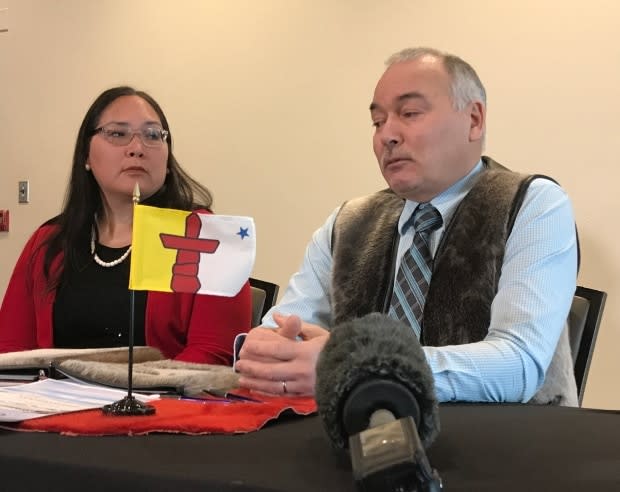Nunavut's gov't, Inuit organization renew promise to work together
Nunavut Tunngavik Inc. and the government of Nunavut have renewed their commitment to work together with the signing of the Katujjiqatigiinniq Protocol.
The signing happened Tuesday in the Koojesse room of the Frobisher Inn. The government's cabinet and NTI's board witnessed the signing.
This isn't the first time NTI and Nunavut's government have recommitted to each other. The organizations have reaffirmed their partnership twice since 1999: first in 2004 and again in 2011, with the Clyde River Protocol.
Why now? — NTI's president Aluki Kotierk quipped: "It's a new decade."
This time, questions focused on how the two parties are handling what has appeared to be a fraught conversation on the future of education in the territory.
Nunavut's government is in the midst of updating the territory's Education Act and Inuit Languages Protection Act, via Bill 25. NTI had asked to have a larger role in the creation of the bill.
"Certainly we have a difference of opinion, in terms of how we've worked together and whether or not it's been a partnership approach, in terms of Bill 25 specifically," Kotierk said.
One of the Katujjiqatigiinniq Protocol priorites is continuing to implement Article 32 of the Nunavut Agreement, which provides Inuit the right to have a say in the government's social and cultural policies.
"I think it's very interesting how the public perception might be that there are things that we're not working well on and that's where the interest often lies, but I think we have many examples where we work well together," Kotierk said.

She gave examples she was proud of, such as the tripartite agreement on health with the federal government, and issues related to poverty reduction. Nunavut's premier Joe Savikataaq added the agreement-in-principle on devolution to that list.
"I think the timing is just right," Savikataaq said. "We have ... a new minority government, which seems to be a lot more willing to work with partners. It's just something we felt the timing was appropriate."
If NTI and the territory can be united in their requests to the federal government, Savikataaq says he feels they will be more successful.
We have many examples where we work well together. - Aluki Kotierk, NTI president
The agreement reaffirms structures that are already in place, including quarterly meetings between the premier and the president of NTI, and the goal of biweekly meetings between the CEO of NTI and the deputy minister of Nunavut's Department of Executive and Intergovernmental Affairs.
NTI is the organization responsible for implementing the land claims agreement, now known as the Nunavut Agreement, and for representing Inuit in the territory. As Inuit are the territory's majority population, Kotierk says, it makes sense that the two collaborate on issues.
Savikataaq says the two groups will continue to have disagreements, but will work through them with meaningful consultation.
"The land claim spells out our obligations and this is just to reinforce our obligations and our commitments to work together for the betterment of Nunavummiut," Savikataaq said.

